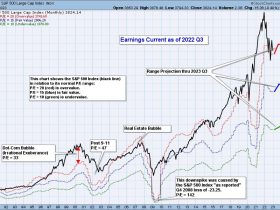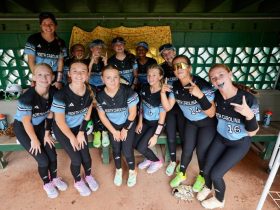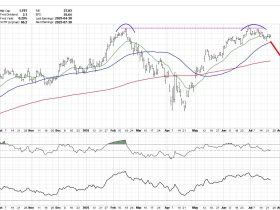If you checked the StockChartsTechnical Rank (SCTR) report on Tuesday morning, you might have seen the massive spike in Starbucks’ (SBUX) change in value of +62.3. It occupied the highest “Top Up” spot for the Large-Cap stocks category.
Huge Spike in Starbucks SCTR Score
A rising SCTR score of 78.5 looks promising, but the sudden spike raised some eyebrows. As you might know, SCTR is your go-to for spotting the strongest stocks from a technical standpoint, as it uses multiple indicators across several timeframes.
SBUX was the Top Up in the Large Cap SCTR category.
SBUX jumped from an ultra-bearish 10 to a bullish 78.5 (this figure will fluctuate slightly as the price changes throughout the day). At this stage, it’s worth a sector check. A glance at the MarketCarpet for the Consumer Discretionary sector shows how SBUX compares to other Consumer Discretionary stocks.
SBUX stock rose over 24.50% on Tuesday.
SBUX stands out with a price jump of 24.50%. To compare the stock’s performance to other stocks within its industry group, click the industry group, in this case, Restaurants & Bars (see below).
What Happened to Starbucks?
In short, Starbucks, after trending down for over a year, just swapped out its CEO. What does that mean? The spike is all about market sentiment. The real test—earnings—won’t show up for a few more quarters, as it takes time for the new leadership to make changes.
So, do you buy on bullish sentiment, or do you wait? Since there is no way to fundamentally gauge this price movement, how can you technically assess this market move? And if you wanted to get in on the action, how can you plot your entry points and identify zones that spell out “stay away”?
Macro View: SBUX’s Fall From Grace
Start with a macro view by looking at the weekly chart of SBUX.
CHART 1. WEEKLY CHART OF STARBUCKS. This chart shows SBUX’s last dramatic uptrend before the stock’s decline, plus several critical support and resistance levels to which the market may continue to respond.Chart source: StockCharts.com. For educational purposes.
SCTR profile. The SCTR window at the top illustrates SBUX’s technical weakening as its price declined. Note that the significant spike matches the latest weekly candle.The $93 level. Do you see the magenta rectangle and the blue dotted line at the $93 level? Notice how the bulls were trying to keep price above that support level and how it eventually failed.The 200-period SMA. The 200-period simple moving average (SMA) didn’t play much of a role until the price broke below $93. Check out the orange circles—bulls found support at the 200-period SMA twice before SBUX’s poor store performance led to its bearish turn.Convergence of $93 support-turned-resistance and the 200-period SMA. On Tuesday, the price spiked an impressive double digits, but the 200-day SMA and the $93 line stopped it (see the last orange circle on the right). These two former support levels have now become strong resistance.
Let’s add another indicator commonly used to gauge support and resistance—Fibonacci Retracement levels. Fib levels are important as both bulls and bears use them to pinpoint entry levels, whether long or short. In this case, we will draw levels from the 2023 peak at $112 to the 2024 low of $72.
The Fibonacci levels are in black, and this chart is a little busier than the one above.
CHART 2. WEEKLY CHART OF STARBUCKS WITH FIBONACCI RETRACEMENT LEVELS. Notice how the critical levels of 50%–61.8% converge with the SMA and market resistance levels.Chart source: StockCharts.com. For educational purposes.
Adding Fib levels to the mix illustrates how the key 50%–61.8% levels align with other resistance levels. It also suggests that the current Fib range could be a prime entry point for shorts, particularly for bears who think the market’s optimism might be short-lived as the bullish case is unproven.
So, is the SBUX caffeine jolt a breakout of a fakeout? At this point, you’ll want to switch over to the daily chart.
CHART 3. DAILY CHART OF STARBUCKS. Mind the gap. It could be a breakaway gap.Chart source: StockCharts.com. For educational purposes.
Tuesday’s price action looks like a breakaway gap, but with weeks of congestion leading up to it (see black trend line for reference). Most breakaway gaps don’t get filled within a week. But, in this case, you’ll want to keep your eye on the gap (see blue box).
Notice how the Chaikin Money Flow is sloping downward and is below the zero line. This suggests that selling pressure prevails, but can change in future trading sessions (if SBUX continues moving upward).
The Moving Average Convergence Divergence (MACD) is above the signal line, suggesting a bullish shift in momentum. However, both are still below the zero line, which indicates bearishness.
If SBUX’s momentum turns bullish, watch the gap and the $83.50 support level (dotted magenta line) for a potential bounce. If the price bounces with strong momentum, it could be a sign that the bearish trend has reversed.
Closing Bell
Starbucks saw a massive spike in price and its SCTR score, but the real question is whether it has enough momentum to keep going or if it’s just a short-lived jolt. While market sentiment is high following the CEO swap, key resistance levels and mixed technical indicators suggest caution. Keep an eye on the $83.50 support level and the gap for signs of a potential trend reversal. The true test won’t come until future earnings reports, but the technicals can help you position yourself to either get in early or avoid a falling knife.
Disclaimer: This blog is for educational purposes only and should not be construed as financial advice. The ideas and strategies should never be used without first assessing your personal and financial situation, or without consulting a financial professional.







